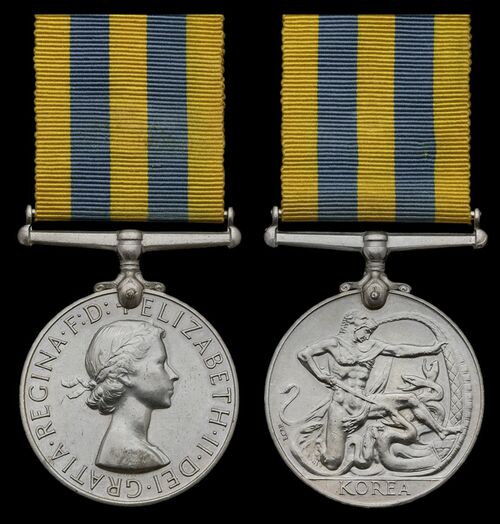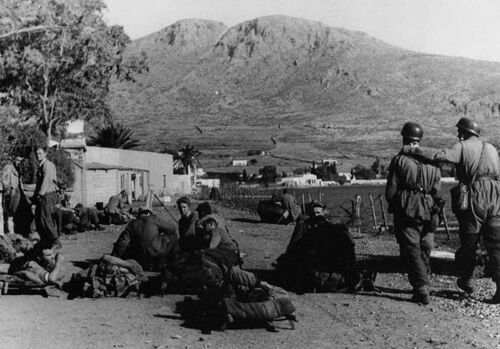Auction: 23001 - Orders, Decorations and Medals
Lot: 63
The Korea Medal awarded to Private M. Carraghar, 1st Battalion, King's Own Royal Regiment (Lancaster), later Royal Army Service Corps, who was taken a Prisoner of War at the Battle of Leros on 16 November 1943
Korea 1950-53, 1st issue (T/3653645 Dvr. M. Carraghar. R.A.S.C.), in its named card box of issue, good very fine
Michael Thomas Carraghar was born at St Helen's on 6 September 1920 and was taken a Prisoner of War at the Battle of Leros on 16 November 1943.
The 1st Battalion, commanded by Lieutenant-Colonel S. A. F. S. Egerton, landed on the island of Leros during the early hours of 5 November and on arrival was immediately ordered to occupy defensive zones in the south of the island. The 2nd Battalion, Royal Irish Fusiliers was already established in the centre of the island with the 4th Battalion, The Buffs occupying the northern sector. The general defensive plan was to occupy positions covering the likely landing beaches; consequently when operations began in the morning of 12 November, the Battalion was dispersed over a considerable area. The attack began when the enemy made a seaborne attack followed by some 700 paratroopers that swarmed the island. In bitter and confused fighting over the following days, besides relentless aerial attacks and with Companies acting independently, one of his comrades, William Moss, gave the following account of the actions they shared in:
'While on the way to attack an enemy position, we had to go in forward, suddenly our Section came under small arms fire, which I presumed to be snipers. Para-troops had descended by now, and were getting organised, at about 1450 hours this attack got more severe. We took up firing positions. Our weapons were hand grenades, one Bren Gun, one Boyes Anti-Tank Rifle and Tommy Guns and Lee Enfield Rifles. With us, at the time was Lieutenant Tiplady, I often wonder if he recovered – he ran into the fire and was wounded, he fell like a log.
After a while, all was quite eerie, it was ‘take cover’ and ‘keep a sharp look-out!’ It must have been 100 yards away when in the sky were blobs of men falling, many were hit. We decided to make an attempt on this position, which we had previously been briefed on. It was a small hill, rising sharply. So we moved on slowly, and cautiously, when suddenly out of the blue came shots, from, I am not certain, a sniper, who was able to pick us off one by one. I was moving on steadily when our Corporal, named, ‘Hicklin’, got shot in his leg; that left myself now to take Command of the remainder of my section. We took up our positions again, for any attack, while doing so Private J Woodward, of Salford, was mortally wounded in his forehead, there was little we could do. So I gave the orders to the remainder of my section to stay with me for orders. At that moment Private Vines was wounded, he was a South Wales Borderer originally.
Now I was left with Private D Hibbert, of Hyde, Cheshire, who was a South Lancashire soldier, a very brave man indeed. Private McDougal from Warrington, Cheshire, Private H Acton (Motor Transport platoon). In the distance was Private Robinson of Bradford, near Belle Vue, Manchester, spotted a transport on the ground which was off-loading supplies and men, it seemed to be in difficulty. So I gave the order to my Bren gunner to fire a few bursts of automatic fire, while the remainder of my Section returned to their own trenches on Mount Clidi under this covering fire.
It was like an ambush, but luckily we got back safe and sound after losing some very brave pals of my section.
The next time I escaped was after Major Tilly gave an order to counter attack to the forward positions on ‘Fortress’. Our positions had now changed hands, but we took it back again. Sergeant Lea was capable now of turning the enemy’s weapons on them. This man had a first class training on weaponry. Staff Sergeant Johnson, of the South Wales Borderers, was now getting worried with all the Stuka Dive Bombers, he was surprised to see us back and we reinforced his section, capturing a few prisoners...Morning came and we were told where out positions were, and off we went to fight again.
We arrived on Mount Clidi again and gave a good account of ourselves, but later on a Lieutenant Horne, (1st King’s Own) gave us all an order. He said,
“I am sorry to inform you men, you have done a wonderful job, but now I have to tell you that the Island has been split in two, at the weakest point, between Alinda and Gurna Bays, and we now have to capitulate and all meet at a given reference point. Hand in your small arms weapons etc."
The journey now was to be transported to Athens, en route by ship, we were packed in like sardines.'
Just one Officer and 57 other ranks of the unit made it off. Carraghar was not one of them and he went 'behind the wire', being held variously at Torgau Camp and Stalag IV B (Muhlberg). Returned home, he settled in Teddington, London and died in late 2000.
Subject to 20% VAT on Buyer’s Premium. For more information please view Terms and Conditions for Buyers.
Sold for
£200
Starting price
£60







